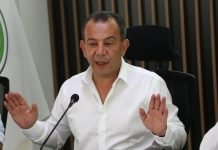Refugees in Turkey’s Bolu province said they are worried about their future after the mayor said on Monday he would impose water and solid waste tax 10 times the normal tax on refugees in an attempt to force them to leave.
Journalist Hacı Bişkin from the Duvar news website, who interviewed several refugee families in Bolu, said although there were very few refugees in the province, hate speech made it seem like their numbers were high. “They constitute only one percent of the province and mostly get along with the locals,” he said. “Refugees only want to live a safe and decent life.”
Bişkin said several Syrians were afraid to give an interview. Others said they could not believe the mayor would utter such anti-refugee sentiment in public. “We knew the mayor didn’t want us, but we never imagined he would contemplate taking such drastic measures against us,” said one Syrian.
They said when one political figure makes such remarks against refugees, the locals immediately act on those remarks and increase rents or make it clear they’re not welcome.
“Who would want to leave their country?” asked one refugee. “We are here because we have nowhere else to go. If the mayor’s plans are carried out, we won’t be able to stay here.”
Muhson Nasr from Afghanistan said he would definitely be killed by the Taliban if he were to return home. “We have such a difficult life here already. How are we supposed to survive if we have to pay extra taxes?” he said.
Zafer Tunçer, a shop owner, said the mayor had the right to impose extra taxes. “I would support the mayor even if it were 100 times more the normal tax,” he said. “Syrians have been our guests for long enough. I just want them out of this county as soon as possible.”
According to Bişkin, following the mayor’s remarks many Syrians started preparing to leave the province, while Afghans and Iraqis decided to wait and see what happens. Many refugees said they were afraid to be seen in public and refrained from sitting in the parks or spending time outside.
Locals also believe that refugees should not be comfortable in public spaces. “Many people openly express their anti-refugee sentiments,” said one local. “Refugees can’t wander the streets as comfortably as they used to.”
Indeed, when Bişkin sat in a park with a group of refugees from Afghanistan a security guard came and told them to leave. “She told us the situation with Syrian refugees was tense and that we needed to leave,” said Bişkin. “She also told us that refugees were not allowed to sit in parks and that we could call the municipality for confirmation if we didn’t believe her.”
Some locals expressed awareness of refugees being exploited in the labor force and said they pitied them but still preferred them to leave Turkey instead of improving their living and working conditions.
Bişkin said many locals were adamant that Syrians in particular had overstayed their welcome. “Refugees from Afghanistan are poor farmers who are trying to help their families back home, but Syrians are just enjoying the benefits of our country and are not at all poor or in need,” said one local.
The presumption that Syrian refugees are enjoying benefits in Turkey is based on an agreement that was signed between the European Union and Turkey in 2016, according to which the EU granted Turkey a total of €6 billion in humanitarian assistance meant to cover the basic needs of refugees.
However most refugees have said the payments they receive are not enough to cover all their expenses and that they need to work under very poor conditions to make ends meet.
Many experts have emphasized that these presuppositions along with anti-refugee remarks from politicians have fueled hate crimes across the country. Speaking to Deutsche Welle Turkish service (DW), Dr. Ulaş Sunata said the tension between locals and refugees in Turkey had reached a dangerous point.
“Politicians and the media are pointing to Syrians as the ones responsible for all the nation’s problems such as the economic crisis and even the pandemic,” she said.
Experts agree that many politicians aim to win more votes by vilifying refugees and promising locals that if they come to power they will send them back home. However, this is a dangerous move that threatens the refugees’ safety, they say.
There has recently been an increase in hate speech targeting refugees with a new wave of arrivals from Afghanistan. Prominent people who have publicly welcomed migrants have been targeted and called traitors.
Anti-refugee sentiment has also been expressed by opposition politicians. Main opposition Republican People’s Party (CHP) leader Kemal Kılıçdaroğlu recently promised to send Syrians who took refuge in Turkey fleeing the civil war in their homeland back to Syria if his party comes to power
According to UNHCR Turkey hosts the largest number of refugees worldwide. The country is currently home to some 3.6 million registered Syrian refugees along with close to 320,000 persons of concern from other nationalities.















